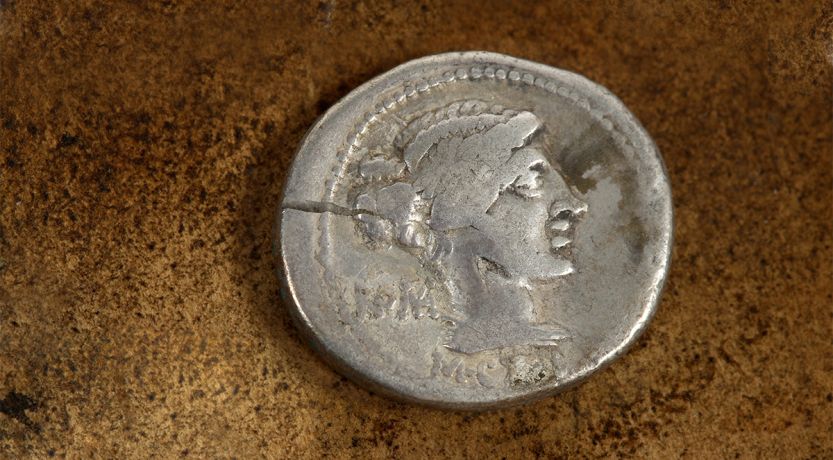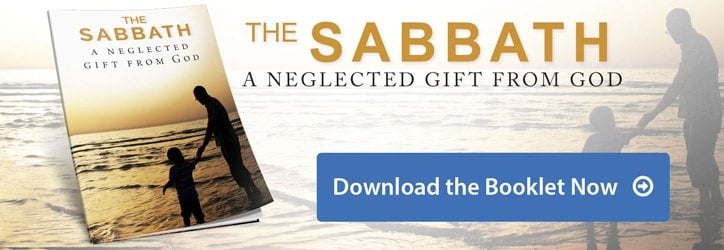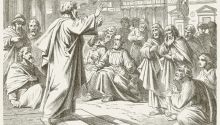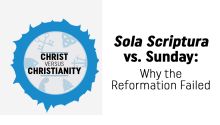.
The Calm Before the Storm
 “There is a saying, “There are decades where nothing happens, and there are weeks when decades happen.” Looking at events in the world right now that certainly seems true. The global order we have known for many years is unraveling. Russia’s invasion of Ukraine is forcing European nations to reconsider their defenses. The world we have known is changing day by day.
“There is a saying, “There are decades where nothing happens, and there are weeks when decades happen.” Looking at events in the world right now that certainly seems true. The global order we have known for many years is unraveling. Russia’s invasion of Ukraine is forcing European nations to reconsider their defenses. The world we have known is changing day by day.
First the COVID-19 pandemic. Now war. What is next? Famine? Very possibly. We could see shortages in wheat and corn as war comes to a critical region that grows vital grain supplies for the world. It will be the developing nations of Africa and Asia that will suffer most when they are not able to obtain needed grains for their people.
War in a place like Ukraine has ripple effects far beyond its borders. Wherever you live there is likely to be mostly peace and stability. But I have a feeling this war will have implications for all of us in the coming months. Something big in the world has changed. We are living at a dangerous moment, and we need to understand.
When I was a young man, my mentor was fond of saying, “Prepare now for the trouble to come.” He would say it so often you grew tired of hearing it. That phrase has come back to me in recent days. We should be preparing for a period of increasing world trouble that will come to our doorstep.
We are to be children of light and not darkness. When we focus on the light, we can reach a calm and confident state of mind. We can fight off anxiety and fear that comes with the news of the day. This is time for a disciple of Jesus Christ to focus on preparing for the time beyond the troubles of this age. We who live now have before us the opportunity and challenge to prepare now for the coming age of Christ’s reign on earth. The wise will understand and seize the moment.
Beyond the tumultuous times of today lies the promise of a transformed world of peace and plenty—the age of Christ's glorious reign on the earth. This chapter from our study guide, You Can Understand Bible Prophecy, titled, “The Millennial Reign of Jesus Christ,” gives you hope and understanding. Please take a moment to read it now.”
Until next time,

Darris McNeely
Beyond Today presenter
_______
“Examine Yourselves”
2 Corinthians 13:5
“Examine yourselves as to whether you are in the faith. Test yourselves. Do you not know yourselves, that Jesus Christ is in you?—unless indeed you are disqualified.

The apostle Paul encouraged the Christians in Corinth to examine themselves, to test whether they were allowing Jesus Christ to live in them. Self-examination should be a regular part of the Christian life of change. It is a vital aspect of the conversion process.
For more about self-examination and conversion, see the articles in the section on “Christian Conversion.”
“Examine Yourselves”: What Does It Mean to Be Disqualified?
“Paul told Christians to examine themselves before the New Testament Passover. How should we interpret his warnings about disqualification and unworthiness?

The testing of Roman coins helps us understand the word Paul used for examine. The coins were expected to pass the test, and so are we.
Coin is Volume 90%
It’s one of the more intimidating verses in the entire Bible:
“Examine yourselves as to whether you are in the faith. Test yourselves. Do you not know yourselves, that Jesus Christ is in you?—unless indeed you are disqualified” (2 Corinthians 13:5).
Today, these passages can be cause for serious concern for any Christian in progress. We each know our own flaws and shortcomings better than anyone. We know the sins we struggle with. We know how many times we’ve had to pray for forgiveness. We know how far we are from where we want to be.
And for so many of us, there are the questions—the ever-present questions that assault us in moments of quiet introspection:
Am I disqualified? Am I unworthy? Is Jesus Christ really in me? Have I failed to discern the Lord’s body?
Let’s talk about that.
(Learn what the Passover is and why it matters in “Passover: What Did Jesus Do for You?”)
Understanding the words Paul used
When Paul wrote, “Test yourselves,” he used a form of the Greek verb dokimazo. He used the same verb when he wrote, “Let a man examine himself.”
Something important gets lost when we translate that verb from Greek into English. In English, when we decide to examine or test something, it might be because we’re suspicious of it—because we suspect there’s something wrong with it.
That’s not how dokimazo works.
Like most civilizations, the Roman Empire had to deal with counterfeit currency. The easiest way to counterfeit a Roman coin was to make a duplicate out of a cheaper metal (like copper), then coat the outside with a more precious metal (like silver).
The easiest way to identify these counterfeit coins was to gouge them with a chisel, exposing the inside. An official coin tester in the marketplace would make these gouges to prove that coins were, in fact, genuine. Coins that passed this test were dokimos—approved, genuine. Coins that failed were adokimos—disqualified, counterfeit.
The expectation is that you will pass the test too.
The unique thing about dokimazo is that it implies an expectation. The focus of the test was not to expose something as counterfeit, but to verify it as genuine. HELPS Word-studies explains that dokimazo “is done to demonstrate what is good, i.e. passes the necessary test,” adding that it “does not focus on disproving something (i.e. to show it is bad).” While some coins would not pass the test, the expectation was that they would.
Which means the expectation is that you will pass the test too.
Self-examination should not leave us uncertain
People are a lot like those ancient coins. Everyone can see what you are on the outside. But only you and God know who you are at your core. Only you and God know your deepest thoughts and desires. Only you and God know if you’re truly serious about and dedicated to this way of life.
But it shouldn’t be a mystery to us. Paul’s question, “Do you not know yourselves, that Jesus Christ is in you?—unless indeed you are disqualified,” implies that we should know ourselves. We should know whether Jesus Christ is in us. We should know whether or not we’re disqualified.
Does your core match up with your outer layer? Are you the same person in private as you are in public? Are you committed, or are you just pretending?
Are you dokimos or adokimos?
Self-examination will not reveal perfection
This isn’t about being perfect.
You can’t be perfect. Not in this life.
The sacrifice of Jesus Christ is what makes us worthy—not anything we could possibly do.
When the baptized men and women of the Church of God come together this year to eat the bread and drink the wine of the New Testament Passover, none of them will be worthy of it. The sacrifice of Jesus Christ is what makes us worthy—not anything we could possibly do.
What we can do is eat and drink it in a worthy manner. To come to the Passover with a deep gratitude and respect for the body and the blood of Jesus Christ—to take those symbols with an understanding of what it took for us to be justified in the eyes of God—to know that our “right to the tree of life” (Revelation 22:14) was not earned but given through a sacrifice we could never deserve.
(Read more about that sacrifice in “Why Jesus Had to Die.”)
When we repent, when we are baptized, when we accept that who we are right now is not who God wants us to ultimately become, we commit ourselves to a lifetime of change—a lifetime of overcoming this world’s influences and our own human weaknesses.
That is to say, a lifetime of not yet being perfect.
A lifetime of genuinely striving, with God’s help, but not yet living up “to the measure of the stature of the fullness of Christ” (Ephesians 4:13).
That’s not the same as being disqualified. That’s just what it means to be human in pursuit of living like God. Being disqualified is about being counterfeit—about passing ourselves off as Christian when, in fact, we have no intent or desire to even try to live that way of life.
You know if that’s you. And you know if that’s not you. That’s what the testing and the examining are about.
Paul told Timothy, “Be diligent to present yourself approved [dokimos] to God, a worker who does not need to be ashamed, rightly dividing the word of truth” (2 Timothy 2:15).
No Christian in progress should go through the process of self-examination and still be wondering if he or she is secretly disqualified. If you are seeking God, if you are repenting of your sins and striving to replace them with godly character (no matter how bumpy the road), if Christianity is more than just a show you’re putting on for the benefit of others, then you are dokimos.
And if you are dokimos, you are a worker who does not need to be ashamed.”
Check that all there at: https://lifehopeandtruth.com/life/christian-living/christianity-in-progress/examine-yourselves-disqualified/
________
How to Increase Your Life Expectancy 12 to 14 Years
What can physicians do to promote healthy, life-extending, lifestyle changes?
Transcript of YouTube: https://youtu.be/dGSMiKuqaY8
Below is an approximation of this video’s audio content. To see any graphs, charts, graphics, images, and quotes to which Dr. Greger may be referring, watch the above video.
“A pivotal paper published in Europe more than a decade ago, entitled “Healthy Living Is the Best Revenge,” found that adhering to just four simple healthy lifestyle factors compared to none could potentially have a strong impact on the prevention of chronic diseases. We’re talking nearly 80 percent less chronic disease risk––slashing diabetes risk by 93 percent, dropping heart attack risk by 81 percent, cutting stroke risk in half, and cancer by 36 percent.
Think about what that means. The potential for preventing disease and death is enormous. In the U.S. alone every year, there are a half million heart attacks, a half million strokes, a million new cases of diabetes, and a million new cancer diagnoses. The message is clear: adopting a few healthy behaviors can have a major impact. What are those four fabled factors? Never smoking, not being obese, averaging about a half hour of exercise a day, and adhering to healthy dietary principles, like lots of fruits, vegetables, and whole grains, and less meat. Follow those four simple rules and boom! Enjoy nearly 80 percent reduced risk of major chronic diseases.
What does that mean for mortality risk? A similar batch of four health behaviors combined predicted a four-fold difference in total mortality, with an estimated impact equivalent to 14 years in chronological age, meaning the individuals were dying at such a reduced rate that it was as if they were 14 years younger. “Finally, a Regimen to Extend Human Life Expectancy.” This commentary was in reference to this study, where a similar analysis of the impact of healthy lifestyle behaviors on life expectancies was made, but this time it looked directly at the U.S. population, which is particularly important, since Americans have a shorter life expectancy compared with residents of nearly all other high-income countries. The researchers concluded that adopting a healthy lifestyle could substantially reduce premature mortality and prolong life expectancy in U.S. adults. Okay, but by how much? They estimated that adherence to a low-risk lifestyle could prolong life expectancy at age 50 years by 14.0 years in women and 12.2 years in men. So, if you’re 50 right now, instead of only living to 79 if you’re a woman, and 75½ if you’re a man, taking even just basic care of yourself could propel you to an average life expectancy of 93 if you’re a woman and 87½ if you’re a man.
The bottom line is it’s never too late to turn back the clock. A midlife switch just to the basics, like at least five daily servings fruits and vegetables, walking even like 20 minutes a day, maintaining a healthy weight, and not smoking results in a substantial reduction in mortality even in the following few years. We’re talking a 40 percent lower risk of dying in the subsequent four years. So, making the necessary changes to adhere to a healthy lifestyle could be considered extremely worthwhile, and middle age is certainly not too late to act.
As an aside, realizing the 12 to 14 years of added life study was based on data from health professionals, that got me excited about all the potential knock-on effects. If health professionals start getting healthier, they can become role models for more healthful living and potentially save more lives than just their own. But that may have just been wishful thinking. Practicing what you preach can sometimes backfire. Evidently, “displays of excellence can paradoxically turn off the very people they are trying to inspire.”
You’d assume that not being a hypocrite and trying to walk the walk would just lead to positive consequences, inspiring confidence in others. Don’t you want a dance instructor who can dance, a music teacher who can play, and a health professional who’s healthy? But this simple intuition fails to take into account concerns about making other people feel inadequate. Like you know how vegetarians are the targets of a surprising amount of hostility and ridicule. That’s because they may come off as morally superior and make people feel like they’re being looked down upon.
There was an elegant demonstration of this phenomenon in this study where “Principled deviants who take the high road threaten others’ moral self-worth.” This is what they did. Research subjects were asked to complete a racist task by an experimenter, and those moral rebels who refused to obey were cheered by observers but were disparaged by participants who had themselves gone through with it, and for whom the rebel’s stance thus an implied indictment of their spinelessness. Isn’t that interesting?
So, when doctors portray themselves as “the picture of health,” patients might think they’re being holier-than-thou and unintentionally alienate people, potentially turning off the very patients who most need their help. You can see how someone with a weight issue might feel threatened and judged by a physician triathlete. But what are we supposed to do? We want healthy practitioners.
Physicians who smoke are less likely to tell their patients to quit smoking, physicians who are overweight are less likely to counsel their patients about weight, and physicians who don’t work out are less likely to talk about exercise. What we can do to make patients more comfortable is emphasize that our role is to help people meet their own personal health goals, whatever they may be. Studies show that when doctors do this, taking this approach, it increases the appeal of fitness-focused physicians to overweight patients. So, we can then display exemplary behavior, while at the same time not inadvertently alienate the very people who would benefit most from our guidance.” From: https://nutritionfacts.org/video/how-to-increase-your-life-expectancy-12-to-14-years/?
_______
 “Is the Sabbath God’s gift for all people, or is the Sabbath just a commandment for the Jews? Who does the Bible say the seventh-day Sabbath is for?
“Is the Sabbath God’s gift for all people, or is the Sabbath just a commandment for the Jews? Who does the Bible say the seventh-day Sabbath is for?
 Was the Sabbath Changed to Sunday?
Was the Sabbath Changed to Sunday? Did the Early Christians Worship on Sunday?
Did the Early Christians Worship on Sunday? Who Changed the Day of Worship From Saturday to Sunday? Why?
Who Changed the Day of Worship From Saturday to Sunday? Why? Did God Create the Sabbath in Genesis 2?
Did God Create the Sabbath in Genesis 2? Is the Sabbath a Sign of God’s People?
Is the Sabbath a Sign of God’s People? Lord of the Sabbath: Did Jesus Christ Break the Sabbath?
Lord of the Sabbath: Did Jesus Christ Break the Sabbath? Did Paul Change the Sabbath?
Did Paul Change the Sabbath? Does Romans 14 Prove There Is No Sabbath?
Does Romans 14 Prove There Is No Sabbath? Sabbatismos: Does Hebrews 4:9 Teach Rest on the Sabbath?
Sabbatismos: Does Hebrews 4:9 Teach Rest on the Sabbath? Which Day Is the Seventh Day?
Which Day Is the Seventh Day? How to Keep the Sabbath Holy
How to Keep the Sabbath Holy The Sabbath: A Blessing for Families
The Sabbath: A Blessing for Families A Tale From Two Cities: When Is the Christian Sabbath?
A Tale From Two Cities: When Is the Christian Sabbath? “A 4-Year-Old Child Knows Saturday Is the Sabbath!”
“A 4-Year-Old Child Knows Saturday Is the Sabbath!” Sola Scriptura vs. Sunday: Why the Reformation Failed
Sola Scriptura vs. Sunday: Why the Reformation Failed “A lost loved one is in the grave, unconscious and waiting for the resurrection to life promised by God, when they will have the chance to be reunited with their friends and family.
“A lost loved one is in the grave, unconscious and waiting for the resurrection to life promised by God, when they will have the chance to be reunited with their friends and family.











